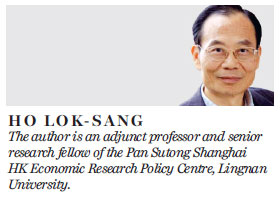Dispute over co-location is futile
Updated: 2015-12-22 09:42
By By Ho Lok-sang(HK Edition)
|
|||||||
Ho Lok-sang says those stirring up controversy over the plan to have mainland border clearance at the Kowloon terminus are engaging in another form of political point-scoring
In order for the costly high-speed rail project being built in Hong Kong to efficiently link up with the mainland and allow the movement of people between the two jurisdictions, immigration and customs clearance has to be performed at one location. This arrangement will be the most convenient and quickest option for passengers. What then can prevent this from happening?
Well, according to some legislators, allowing mainland officials to perform their legal duties in Hong Kong will undermine the "One Country, Two Systems" legal framework. They argue that national laws not related to national defense, foreign affairs and other matters specified to be beyond Hong Kong's jurisdiction are not supposed to be implemented in the SAR.
This alarmist reasoning actually defies logic. The "One Country, Two Systems" legal framework is there to ensure Hong Kong people can continue to live under its common law system and that they will not have to be subject to national laws while living in Hong Kong. Can anyone explain how co-location of immigration and customs clearance can change this?
It has been noted that currently, border crossings at the Hong Kong-Shenzhen Western Corridor are already operating under the co-location principle. While mainland and Hong Kong immigration and customs reside on their respective sides of the border along the Shenzhen River, Hong Kong's border clearance is done on leased mainland land at Shenzhen Bay connected to the western corridor. This arrangement has not resulted in Hong Kong laws applying on the mainland. So then, why can't a similar arrangement be made? This can allow mainland immigration and customs officers to perform specific duties in a restricted leased area in Hong Kong.
If a specific leased site has been designated for border clearance by mainland officers, then no Hong Kong person's legal rights are changed. When the site is leased to the mainland, as long as the lease is in effect, this site comes under mainland jurisdiction. Application of mainland laws on the site therefore becomes legitimate. Let us examine the situation more closely.
Now, if someone has committed a criminal offense under mainland law and they travel from Hong Kong to the mainland, under border clearance in separate locations they will be stopped and arrested on the mainland side when they try to land.
If they travel from Hong Kong to the mainland, and if there are co-located border clearance facilities, they will be stopped and arrested on the leased immigration checkpoint in Hong Kong. The result will be the same.
But if they have not committed any indictable offense in Hong Kong and if they go about their daily life without trying to get into the mainland, then they will not be arrested. No immigration or police officers will have the right to arrest them as long as they do not try to cross the border.
Those people who have not committed any offense on the mainland, but are deemed to be undesirables and not to be admitted, will be denied entry - with or without co-location.
For all other citizens, co-location only enhances convenience. There is no way that anyone's rights are undermined. So where is the threat to the "One Country, Two Systems"?
The "One Country, Two Systems" principle works best when there is trust between Hong Kong and Beijing. If we give up this trust, we will only be hurting ourselves. We can clearly see that no one is a winner if we somehow block implementation of co-location. Some alarmist politicians may think they are scoring points because they are stirring up fear on this issue. But members of the Hong Kong public and mainlanders using the high-speed rail are looking forward to having greater convenience. They will certainly not thank these politicians for causing problems over the matter. But if Hong Kong people are fooled by this alarmist talk - and distance themselves from Beijing - then business and cultural interactions will suffer.
Lin Feng, professor at the School of Law of the City University of Hong Kong, sees no problem with leasing land to the mainland. Moreover, former legislator Ronny Tong Ka-wah has also said that Article 23 of the Basic Law explicitly says Hong Kong should enact its own laws to safeguard national security. There should be no fears that Beijing will introduce national security laws in Hong Kong - unless Beijing decides to tear the Basic Law up. Given China's sovereignty over Hong Kong, Beijing certainly has this prerogative. What prevents Beijing from doing so is its willingness to abide by its promise to adhere to the "One Country, Two Systems" principle. If Beijing does not want to keep its promise, opposing co-location on land leased from the SAR will not change its mind. If Beijing wants to keep this pledge then this show of distrust will only erode its belief that Hong Kong can be relied upon to uphold the "One Country, Two Systems" principle.

(HK Edition 12/22/2015 page9)